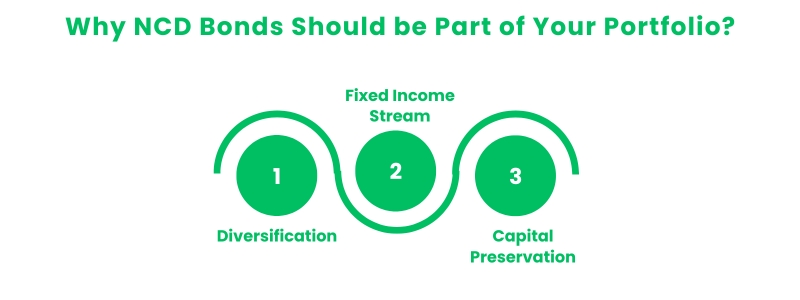Today, we’re going to dive deep into the fascinating realm of NCDs (Non-Convertible Debentures). So, grab your favorite beverage, get comfortable, and let’s unravel the secrets of Non-Convertible Debentures together!
Discover the exciting prospects of NCD investments as we present to you an exclusive list of NCD issue offers list 2023 that can potentially enhance your portfolio.
Welcome to the world of investment opportunities! If you’re someone who is keen on expanding your portfolio and exploring different avenues to grow your wealth, then you’ve come to the right place.
What is NCD Issue?
Let’s start with the basics. NCDs, or Non-Convertible Debentures, are fixed-income instruments issued by corporations to raise funds from the public. In simple terms, when you invest in Non-Convertible Bonds, you’re essentially lending money to the issuing company in return for periodic interest payments and the repayment of the principal amount at maturity.
Why NCD Bonds Should be Part of Your Portfolio?
1. Diversification: NCDs offer a unique opportunity to diversify your investment portfolio beyond traditional avenues like stocks and mutual funds. By adding Non-Convertible Debentures to your portfolio, you spread your risks and reduce the impact of volatility in the market.
2. Fixed Income Stream: One of the significant advantages of Non-Convertible Debentures is the predictable and steady income stream they provide. Unlike stocks, which can be volatile, NCDs offer a fixed interest rate, ensuring a regular cash flow.
3. Capital Preservation: Non-Convertible Debentures are considered relatively safer than equities since they are secured by the assets of the issuing company. This added layer of security helps protect your capital to a certain extent.

How to Purchase Non-Convertible Debentures?
Purchasing NCDs is a straightforward process. Here’s a step-by-step guide to help you get started:
1. Research: Understand the different NCDs available in the market, their credit ratings, interest rates, and other relevant details.
2. Choose the Right NCD: Select the Non-Convertible Bonds that align with your risk appetite, investment goals, and duration preferences.
3. Open a Demat Account: If you don’t already have one, open a free Demat account with a registered depository participant (DP).
4. Place an Order: Contact your broker or use an online trading platform to place an order for the desired NCDs.
5. Monitor and Manage: Keep track of your Non-Convertible Debentures investments, including interest payments, maturity dates, and potential opportunities for selling or reinvesting.
Key Features of NCDs:
1. Interest Rate: Non-Convertible Debentures come with predetermined interest rates, which are usually higher than what you would earn from traditional fixed deposits or savings accounts.
2. Tenure: Non-Convertible Bonds have a specific tenure, ranging from a few months to several years. Investors can choose the duration that aligns with their investment goals and liquidity requirements.
3. Credit Rating: Non-Convertible Debentures are assigned credit ratings by independent rating agencies, indicating the issuer’s creditworthiness. Higher-rated NCDs offer lower default risk but may provide slightly lower interest rates.
4. Convertibility: Unlike convertible debentures, Non-Convertible Debentures cannot be converted into equity shares of the issuing company. However, this makes them attractive to investors seeking a fixed-income instrument without the complexities of equity participation.
Key Benefits of NCDs:
1. Regular Income: Non-Convertible Bonds provide periodic interest payments, offering a reliable income source to investors who depend on regular cash flows.
2. Liquidity: Non-Convertible Debentures can be traded on stock exchanges, providing an opportunity to sell them before maturity if needed. This enhances the liquidity and flexibility of your investment.
3. Tax Efficiency: Non-Convertible Debentures offer tax advantages, especially if you opt for the cumulative interest payment option. The interest income is taxed only at maturity, allowing for potential tax savings.
4. Higher Returns: Compared to traditional fixed deposits, Non-Convertible Debentures often offer higher interest rates, enabling you to earn a better return on your investment.
Types of Non-Convertible Debentures:
1. Secured Non-Convertible Debentures: These Non-Convertible Debentures are backed by specific assets of the issuing company, providing an additional layer of security for investors.
2. Unsecured Non-Convertible Debentures: Unsecured Non-Convertible Debentures are not backed by any specific collateral, making them riskier than secured NCDs. However, they often come with higher interest rates to compensate for the increased risk.
3. Convertible Non-Convertible Debentures: These Non-Convertible Debentures offer the option to convert the debentures into equity shares of the issuing company at a predetermined price and within a specified period. This provides investors with the potential for capital appreciation.
Unlocking the Power of NCDs
Congratulations! You’ve now embarked on a journey of understanding the powerful investment instrument known as Non-Convertible Debentures. We’ve covered the definition of Non-Convertible Debentures, why they should be part of your portfolio, their key features, and benefits, and how to purchase them, and even explored different types of Non-Convertible Debentures.
Armed with this knowledge, you can confidently explore and evaluate Non-Convertible Debentures as a potential addition to your investment strategy. Remember, diversification, regular income, and capital preservation are some of the exciting rewards Non-Convertible Debentures can offer.
Top NCD Stocks In 2023: These are the top Company’s NCD Stocks to look for Piramal Capital & Housing Finance Ltd, National Bank for Agriculture & Rural Development, and Shriram Transport Finance Company Ltd
So, go forth, dive into the world of Non-Convertible Debentures, and make your investments flourish!
